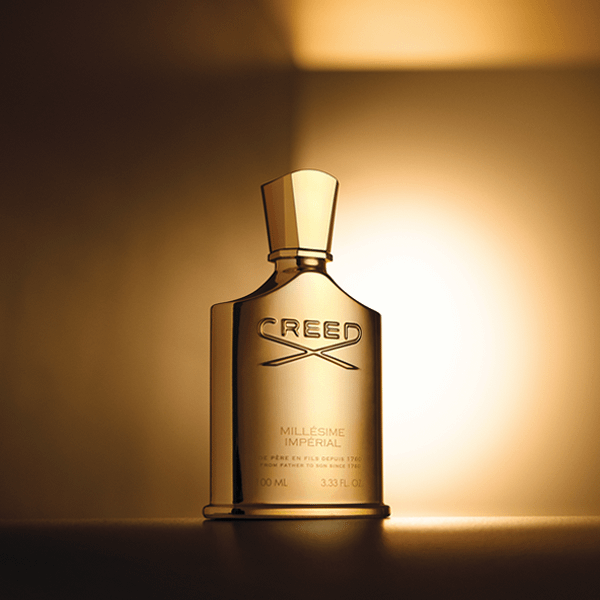Luxury giant Kering announced on Monday its plans to acquire luxury French fragrance brand Creed. The acquisition marks Kering’s first foray into in-house cosmetics, following its declaration of intent earlier this year.
“The acquisition clearly marks a major step for Kering Beauté, allowing it to reach critical mass in this category,” Raffaella Cornaggia, CEO of Kering’s beauty division Kering Beauté, said in a statement.
Kering agreed to an all-cash undisclosed purchase amount to take 100 percent ownership of Creed using funds managed by BlackRock and the current chairman of the company, Javier Ferran. The deal is expected to finalize later this year. Creed employs 700 and reported €250 million in annual sales last year.
“I am thrilled that today our stories and values come together around this spirit of family entrepreneurship and excellence to accelerate our journey in beauty, and I am delighted that the brand is joining Kering’s collection of luxury Houses,” François-Henri Pinault, Chairman and Chief Executive Officer of Kering, said in a statement.
The House of Creed
Renowned for its range of fragrances and perfume oils, particularly the Aventus fragrance, The House of Creed, developed by sixth-generation master perfumer Oliver Creed, has a devoted following. In the world of perfume, Creed’s name evokes the kind of reverence inspired elsewhere “by Pele, Bob Dylan or – this last is an analogy others have drawn – Picasso,” Robert Chalmers explained in The Independent in 2013.
“In an industry with an unrivalled reputation for vacuous hype, the House of Creed has thrived on a different strategy: being, and remaining, magnificent,” Chalmers wrote. “Creed fragrances have been worn by Winston Churchill, Frank Sinatra, Humphrey Bogart, Michael Jackson, Jackie Kennedy, Elton John, Pierce Brosnan, the Queen, Harrison Ford, both Elvises (Presley and Costello), and David Beckham, to name a few. Others on the roll of what Olivier Creed calls ‘my faithful’ have included Prince Charles, Hugh Grant, and Serge Gainsbourg. (‘Spring Flower’, created for Audrey Hepburn, is worn by Julia Roberts and Gwyneth Paltrow.)”

The label’s fragrances are, perhaps so beloved by the world’s greatest storytellers across a range of disciplines because they find a kinship with the scents. Creed is designed to evoke strong emotional responses. The company likens some of these experiences to trekking through a Portuguese forest, the thrill of climbing a mountain range, or the calming serenity of wandering through a flower garden, to name but a few.
The journey to develop Creed fragrances is as equally story-worthy as the scents themselves. Creed, along with his son Erwin, have traveled the globe in pursuit of the finest ingredients. The company says it partners with “passionate farmers” who share Creed’s commitment to excellence. Like other high-end perfumers, ingredients are carefully cultivated and harvested around the world, such as its Moroccan rose — a cherished ingredient that is handpicked just after dawn to preserve its legendary fragrance from the scorching sun.
The ingredients that make the cut are transported to the House of Creed factory in Fontainebleu, which marks the beginning of the next phase in the art of perfume-making. The company says what best serves the fragrance determines the production methods; both traditional labor-intensive techniques and innovative technologies are employed.
“Creed has a unique positioning in the fragrance market,” said Raffaella Cornaggia, CEO of Kering Beauté. “We see a very compelling rationale and mutual strategic benefits in terms of expertise, network, and geographical footprint. We look forward to working with CEO Sarah Rotheram and her passionate team to continue to drive Creed’s success worldwide.”
Are Creed fragrances natural?
Because perfumers are protected from sharing their full ingredients list to ensure the intellectual property of their trade secrets, it’s not clear just what goes into a bottle of Creed perfume. But according to the label, it uses an average of 65 percent natural raw materials in each of its unique scent formulations; the products are free of controversial toxic ingredients including parabens and phthalates.

A product does not need to be 100 percent natural in order to be nontoxic or considered a ‘clean’ perfume; a number of clean fragrance brands rely on safe synthetics. The advantage of synthetics over some natural materials is consistency — the potency and nuance of natural ingredients can vary from harvest to harvest. There are also risk factors such as allergic reactions to natural ingredients that a synthetic can eliminate in some cases.
Others are turning to synthetics as a more sustainable source as climate change is threatening some materials such as vanilla.
The House of Creed says it insists on using only the finest materials, designated as ‘Millésime quality’ — a term borrowed from the winemaking industry to denote the ‘best of the crop’. For Creed, sourcing high-grade ingredients is tantamount to its reputation.
This includes ambergris — a scent long revered for its woody, ambery, sweet-earthy, and musky-marine profile. Ambergris is one of the most distinct and coveted scents and one of the more contentious ingredients in the fragrance world. It’s produced by the digestive system of sperm whales.
As an animal-based ingredient, ambergris is inherently controversial. But its harvest more mirrors the eiderdown feather collecting process rather than farming or hunting — ambergris is secreted by sperm whales and floats to the ocean surface where it is harvested.

While sperm whales are considered endangered species, ambergris is classified as a waste product in several European countries, including France, the U.K., and Switzerland, and is therefore legally allowed to be harvested.
Other animal scents include musk, which can come from the sheath of the musk deer, civet comes from anal glands of the civet cat, and castoreum is an extraction of the beavers’ sacs. Creed uses synthetics outside of natural ambergris.
Will Kering Beauté be sustainable?
The acquisition of Creed as the inaugural label under the Kering Beauté division reflects the sustainable direction of Kering’s other labels including Gucci, Balenciaga, Bottega Veneta, Puma, and Yves Saint Laurent and its “crafting tomorrow’s luxury” sustainability ethos.
Kering calls the purchase a “major step” for Kering Beauté. “A perfect fit with its portfolio of renowned luxury brands, it immediately provides Kering Beauté with the required scale, an outstanding financial profile, as well as a platform, supporting the future development of other Kering Beauté fragrance franchises, by leveraging in particular Creed’s global distribution network.”
The luxury house says Creed’s commitment to ethically sourced ingredients and farmer relationships along with its slow manufacturing will bolster Kering’s sustainability roadmap.

That roadmap is continuing to play a key role in Kering’s future. Since 2020, Kering has reduced its Scope 1 and 2 emissions by more than 70 percent and Scope 3 emissions have declined by more than 50 percent. Kering says its new commitment is to reduce its absolute greenhouse gas emissions by an additional 40 percent across Scopes 1, 2, and 3 by 2035.
“[W]e’ve continued to evolve our strategy to match our long-term vision to help drive Luxury and fashion’s sustainability agenda,” Kering says in its 2020-2023 Sustainability Progress Report. “We are entirely convinced that impact reduction in absolute terms combined with value creation must be the next horizon for truly sustainable companies. The direction is clear and we will continue to look to this horizon, while building on our efforts to Care, Collaborate and Create.”
Creed, one of the very last luxury fragrance houses to carefully source, research, inspect, and commission their own natural raw ingredients, is constantly seeking the finest and most exquisite throughout the globe, Kering says.
Through its “Fragrance for the Future” framework, Creed ensures that its fragrances, which are created with the expertise and techniques of generations past, are “sustainably produced in their laboratory in Fontainebleau on the outskirts of Paris,” Kering says. And this, Jean-François Palus, Group Managing Director of Kering, says makes the acquisition a big one for Kering. “This is a milestone in the development of Kering Beauté, as we believe more than ever in the strong potential of our brands in beauty.”
Related on Ethos:


